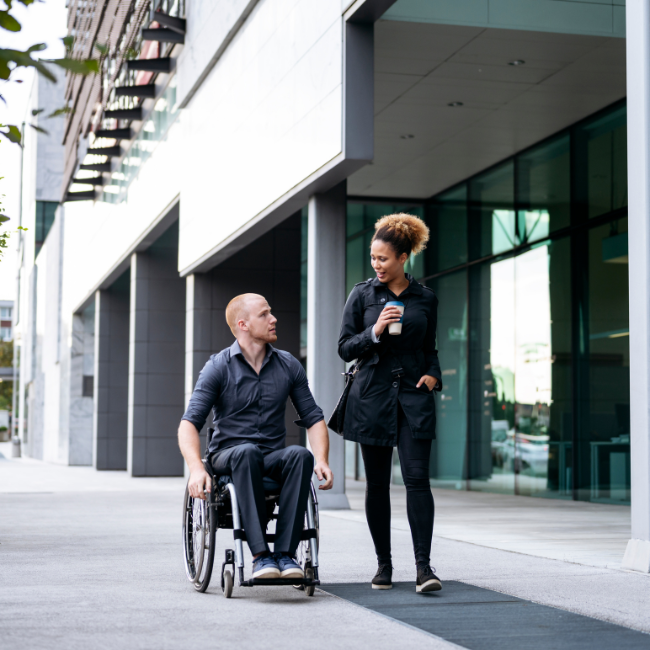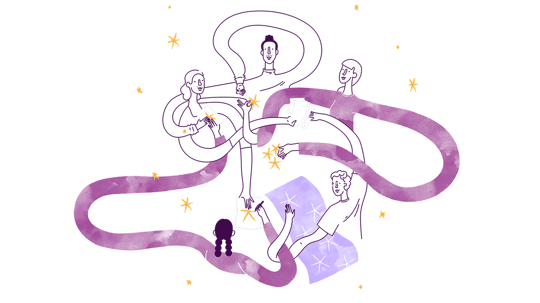Occupational Rehabilitation Services
Navigating the complex and varied nature of injuries, individuals, work and home environments, relationships, and personal injury schemes – is what we do best. As rehabilitation consultants and occupational rehabilitation consultants, we are guided by the philosophy that work and independence are critical to wellbeing. While often complex, we know recovering while working leads to more rapid and sustainable health outcomes.
As a multidisciplinary team of rehabilitation providers, we work through physical, medical, psychological, and social complexities. Our team provides workplace rehabilitation services across more than 90 locations throughout Australia, including major cities such as Sydney, Melbourne, Brisbane, Perth, and Canberra. We adopt a holistic approach to address all aspects of a client’s recovery, ensuring optimal outcomes no matter the location.


.png)
Same Employer Services (Physical and Psychological Injuries)
We support our clients to recover physically and mentally from their injury or illness and manage every aspect of their return to work journey with their employer. We collaborate with all stakeholders involved in our client’s return to work plan, which includes assessing their capacity for the work they will return to and their workplace to make their return as seamless as possible.
Our Same Employer Services offered across Australia include:
- Initial assessments
- Workplace assessments
- Medical case conferences
- Functional Capacity Evaluations
- Activities of Daily Living Assessments
- Ongoing return to work management
.png)
New Employer Services (Physical and Psychological Injuries)
When our clients experience injuries that make it difficult to return to their previous place of employment or role, we work with them to create new vocational plans to support their return to work in a new role or with a new employer. We assess our patients’ physical and cognitive capabilities, interests, educational and employment background, and skills to support them through the process that includes facilitating work placements and trials.
Our New Employer Services include:
- Vocational Services (including digital delivery) with FuturePathways®
- Rehabilitation and career counselling
- Job-seeking education and coaching
- Job placement and work trials
- Ongoing return to work management

Life Insurance & Income Protection Claims
When life takes an unexpected turn due to a traumatic event, illness or injury, we’re here to help you get back on your feet. Our Life and Income Protection Claims services are designed to support your recovery—physically, mentally, and professionally—so you can rebuild your health, independence, and quality of life.
Get expert assistance from our allied health professionals to help you navigate the claims process with a dedicated support system:
- Rehabilitation for Complex Injuries: Specialised care for physical and psychological injuries, focusing on improving mobility and overall wellbeing.
- Daily Living Support: Assistance with aids, modifications, and strategies to enhance independence in everyday life.
- Return-to-Work Solutions: Re-enter the workforce with confidence through our vocational assessments, career counselling, job-seeking education and tailored return-to-work plans.
Reclaim your life, participate actively in your community, and move forward with resilience with a compassionate team of experts who are committed to support your recovery.

Veteran’s Services
Rehabilitation Services by Altius are a national rehabilitation provider contracted with the Department of Veterans’ Affairs to deliver Rehabilitation Services to eligible veterans. For more information on DVA’s Rehabilitation Services, please visit the DVA website.
Supporting veterans in reclaiming their health and independence, our nationwide team provides personalised care tailored to the unique needs of those who have served. With a focus on both physical and psychological wellbeing, we offer a comprehensive range of services designed to enhance quality of life.
Our approach includes:
- Comprehensive assessments to understand individual needs
- Goal-setting that aligns with personal priorities
- Tailored recovery and rehabilitation plans
- One-on-one health coaching
- Sessions with exercise physiologists
- Psychological counselling
- Support for trauma and PTSD
With a compassionate, evidence-based approach, our services are designed to restore not only physical health but also confidence, purpose, and overall wellbeing.

Lifetime Care and Support/Complex/Severe Claims
Depending on the insurance scheme or state where a motor vehicle or workplace accident occurs, those who have suffered a severe or complex lifelong injury may be eligible for lifetime care and support.
Our experienced occupational therapists, with local expertise across over 90 locations throughout Australia, including major cities like Brisbane, Sydney, and Melbourne, work with those who meet the eligibility criteria for lifelong care and support, as well as individuals working through long-term complex and severe claims from injury. These services aim to help those who have suffered a severe or complex injury to increase their independence, improve their ability to participate in their community and continue enjoying life.
Depending on each scheme, these services may include:
- Assessment to determine ongoing needs including equipment and support services.
- Rehabilitation across Australia, such as physiotherapy and occupational therapy.
- Provision of aids and equipment, such as wheelchairs.
- Home and vehicle modifications.
- Identification of need for care services such as domestic services, home and garden maintenance and assistance with personal care.
- Support to return to study or work.
Frequently Asked Questions
Once referred, you can expect a qualified allied health consultant with expertise in areas including occupational therapy, exercise physiology, physiotherapy, psychology, and/or rehabilitation counselling to manage your case according to your unique circumstances.
Typically, your assigned consultant will arrange an initial meeting between you, your employer (where relevant) and/or a nominated treating doctor to assess your current circumstances. They will review your needs, work with you to establish goals and identify an appropriate plan to support you through your recovery and return to work. Depending on the services you've been referred for, your assigned allied health consultant may facilitate regular monitoring of your progress against an established recovery and return to work plan and ensure additional support systems or services during the program, if required.
A vocational assessment is a comprehensive evaluation of an individual’s work profile and potential with consideration to their physical, psychological, and cognitive capabilities.
When utilising the digital platform FuturePathways®, the assessment includes completion of a number of online assessment modules (approx 8 in total) which can be completed in the comfort of an individual’s own home, or in-office with support from a consultant depending on individual preference and need. Completion of these modules can require 1 – 1.5 hours. Following completion of the online modules, a semi-structured interview will occur with an experienced rehabilitation counsellor / psychologist to review the assessment outcomes, and dive deeper into understanding the individual’s circumstances, needs, and goals. The interview aspect can take 1 – 2 hours pending individual complexity and completion of the FuturePathways® assessment tool (additional time may be required in the event FuturePathways® is not completed prior).
As part of the vocational assessment process, individuals are asked to complete a range of psychometric assessments and questionnaires to help in understanding their vocational interests, aptitude, personality, general health and wellbeing.
Individuals will engage in a one-to-one vocational interview where details regarding their employment history, transferable skills and where relevant, their medical history and work capacity are gathered. Individuals who partake in a vocational assessment are often encouraged to provide other supporting documentation or information that can assist in the vocational assessment process. This may include their resume, copies of qualifications, their driver’s license, and or medical certificates or reports.
The vocational assessor will discuss the outcomes and key findings of the vocational assessment with the individual. Through exploration of the labour market, and where relevant collaboratively working with the individual's treatment/medical team, suitable vocational options are identified, and a detailed vocational assessment report is completed.
The job seeking education and coaching programs offered by our experienced team members will vary depending on individual need. Programs are tailored to ensure competitive and independent job searching skills are developed within an appropriate timeframe.
Some of the key topics which may be covered will include (but not be limited to):
- Injury disclosure
- Resume / cover letter creation
- Application submission
- Online job search engines (SEEK, LINKEDIN etc)
- Hidden job market
- Canvassing and networking approaches
- Basic computer operations
- Interview pre and post preparation
- Interview skills training including practice interviews
Placements will be sought accordingly with relevant individual needs and considering relevant legislative opportunities. For example, in NSW use of the SIRA programs including the Work Trial, Job Cover Placement Program (and more!) are actively utilised to engage host employers for the provision of both paid and volunteer placements. Employers are contacted through multiple methods including warm and cold contacts to establish opportunities for individuals. Placements can also be sought through local volunteer agencies and non-profit organisations that can offer a period of unpaid work placement.
Placements can be sought for the purpose of a graduated return to work (for example, for building capacity or confidence), to enhance or develop new and existing skills through on the job training, to establish new employer contacts for use as a reference when applying for new work, to allow on-the-job training associated with formalised re-training, as a trial period prior to commencing a new position with an employer to complete any required training, to provide subsidies to an employer to enhance employment opportunities for individuals; and for many more purposes. The placements are well considered at the time of a vocational assessment to ensure any placement opportunities are identified appropriately.
A Return to Work plan is typically the result of a workplace assessment / evaluation whereby all requirements of the position are assessed in considering the individual’s capabilities and needs. The plan aims to establish a period of graded activities and hours in the role, allowing for pacing and transition back into a workplace.
The Return to Work plan is established in collaboration with all relevant parties, including the employer and individual. Relevant treating medical practitioners may also be consulted in compiling a Return to Work plan.
If you’ve been catastrophically injured in a road accident you may be eligible for lifetime care and support. The schemes are run state by state and are a no-fault insurance funded by a levy on green slips (Compulsory Third Party Insurance). It is best to contact your state government scheme for further information:
NSW: Lifetime Care and Support Scheme – run by iCare Lifetime Care
ACT: Lifetime Care and Support Scheme – run by ACT Treasury
SA: Lifetime Support Scheme – run by Lifetime Support Authority
WA: Catastrophic Injuries Support – run by The Insurance Commission of Western Australia
QLD: The National Injury Insurance Scheme Queensland (NIISQ)
VIC: Transport Accident Commission (TAC)
NT: Motor Accidents Compensation Scheme – run by TIO
TAS: Motor Accidents Insurance Board (MAIB)

